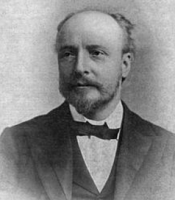










Sir James Dewar, (1842-1923) was a chemist and physicist, best known for his work with low-temperature phenomena. Dewar was born in Kincardine, Scotland, and educated at the University of Edinburgh. He was professor of experimental natural philosophy at the University of Cambridge, England, in 1875 and professor of chemistry at the Royal Institution of Great Britain in 1877, where he was appointed director of the Davy-Faraday Research Laboratory.
Dewar developed structural formulas for benzene (1867). He studied the specific heat of hydrogen and was the first person to produce hydrogen in liquid form (1898) and to solidify it (1899). He constructed a machine for producing liquid oxygen in quantity (1891). He invented the Dewar flask or thermos (1892) and co-invented cordite (1889), a smokeless gunpowder, with Sir Frederick Abel. His discovery (1905) that cooled charcoal can be used to help create high vacuums later proved useful in atomic physics. Dewar was knighted in 1904.
The Dewar flask or vacuum flask/bottle is a container for storing hot or cold substances, i.e. liquid air. It consists of two flasks, one inside the other, separated by a vacuum. The vacuum greatly reduces the transfer of heat, preventing a temperature change. The walls are usually made of glass because it is a poor conductor of heat; its surfaces are usually lined with a reflective metal to reduce the transfer of heat by radiation. Dewar used silver. The whole fragile flask rests on a shock-absorbing spring within a metal or plastic container, and the air between the flask and the container provides further insulation. The common thermos bottle is an adaptation of the Dewar flask. Dewar invented the Dewar flask in 1892 to aid him in his work with liquid gases.
The vacuum flask was not manufactured for commercial/home use until 1904, when two German glass blowers formed Thermos GmbH. They held a contest to rename the vacuum flask and a resident of Munich submitted "Thermos", which came from the Greek word "Therme" meaning "hot."
In 1907, Thermos GmbH sold the Thermos trademark rights to three independent companies: The American Thermos Bottle Company of Brooklyn, NY; Thermos Limited of Tottenham, England; and Canadian Thermos Bottle Co. Ltd. of Montreal, Canada.
Hodgkins gold medal (Smithsonian Institution)
Lavoisier Medal (French Academy of Sciences)
Albert Medal (Royal Society of Arts)
Rumford Medal (1894)
Franklin Medal (1919)